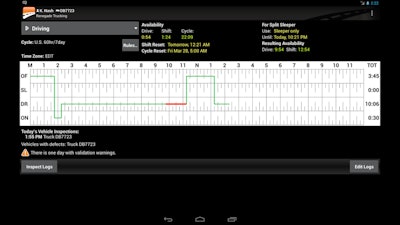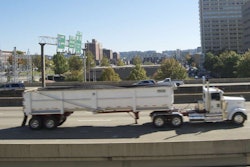 A rule to mandate ELDs is still anticipated in September, ATA says. Also, ATA says it will continue to push against reimplementation of 2013’s rules governing use of 34-hour HOS restarts.
A rule to mandate ELDs is still anticipated in September, ATA says. Also, ATA says it will continue to push against reimplementation of 2013’s rules governing use of 34-hour HOS restarts.Publication of a Final Rule to mandate the use of electronic logging devices by truck drivers appears “by all indications” to be on track for its Sept. 30 projection, said the American Trucking Associations’ Dave Osiecki on Thursday during an ATA media update for trucking industry press and the national media.
And until then, Osiecki says, ATA will make publication of the e-log mandate its top lobbying priority.
Osiecki, ATA’s VP of regulatory affairs, was joined by Chris Spears, the trucking lobbying group’s head of legislative affairs, to offer an update on where upcoming trucking regulations stand in the regulatory pipeline and to reiterate ATA’s stance and efforts on both regulatory and legislative activities.
Driver drug testing issues follow an ELD mandate on ATA’s lobbying agenda, Osiecki said. Publication by FMCSA of a Final Rule to implement the CDL Drug and Alcohol Clearinghouse, also expected this year, is No. 2 behind requiring ELDs, and allowing hair testing to satisfy federal driver drug testing requirements is also high on the list, he said.
ATA will also continue to push for removal of the public rankings in the agency’s Compliance, Safety, Accountability program and permanent suspension of the 2013-implemented hours-of-service rule changes, especially those dictating use of a 34-hour HOS restart.
“We believe that [the portion of the rules now suspended] are not as safe as they could be, and we don’t believe they are as safe as the approach in place from 2003-2013,” Osiecki said.
In addition to the suspension of the rules, FMCSA has also been tasked with justifying them with a five-month field study, as directed by Congress in December. Osiecki says ATA is not sure what Congress or FMCSA will do with the restart rules once the study is completed.
A separate hours-of-service study, however, is also in the works by the Government Accountability Office, he says. The GAO is looking at the projections FMCSA made in its cost-benefit analysis it used to produce the rule and whether those actually occurred. The results of that study are expected in the coming months, he said.
Highway bill, now
ATA’s legislative efforts seemingly could be summed up in a single phrase: Pass a long-term highway bill.
“Our industry pays nearly half the tab,” Spears said of the country’s Highway Trust Fund revenue stream, which has been funded by at-pump fuel taxes since Eisenhower’s presidency. “We have a lot of skin in this game. Our ability to get from Point A to Point B is dependent on infrastructure. We take this very seriously.”
Spears said ATA doesn’t view taxes on fuel as a tax but as a “user fee,” and ATA’s push for highway funding centers on upping the current levels — set in in 1993 — and tying them to inflation, so to avoid running into similar issues again when inflation caps the fuel tax’s ability to fund U.S. roadways.
“Thirty-two short term extensions over the last six years. That can has got a lot of dents, it’s been kicked so many times,” Spears said, referring to Congress’ inability of late to pass a long-term funding bill and instead opting to inject money from the general fund into the HTF as a stopgap measure. “I like to tell our members, you can think back to 1993, a number of them, their trucks were equipped with cassette players. That’s how long it’s been since Congress has dealt with this issue.”
The current stopgap measure, passed last summer, expires May 31. Congress has just five weeks to pass a highway funding measure or road maintenance and construction projects around the country will screech to a halt. Several long-term bills have been floated in Congress, but none have seen much action.
ATA remains opposed to so-called “devolution” — state governments becoming responsible for highway funding — and tolling measures, Spears said, especially on already existing roadways.











